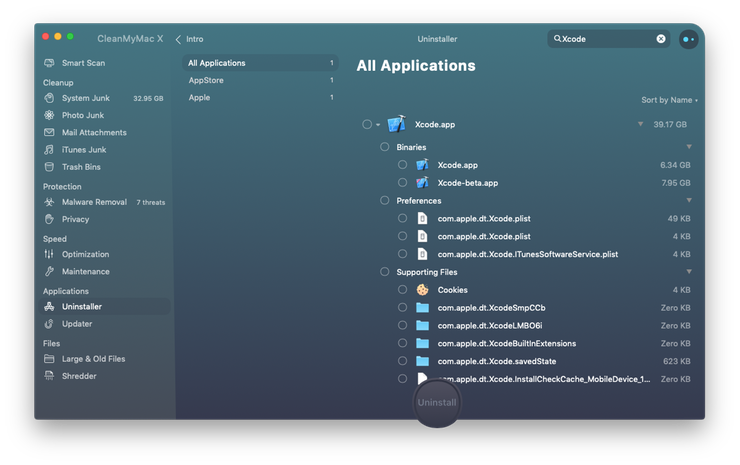

- #UNINSTALL XCODE COMMAND LINE HOW TO#
- #UNINSTALL XCODE COMMAND LINE INSTALL#
- #UNINSTALL XCODE COMMAND LINE FULL#
How many folders and files were installed? The response would have more than what’s in CommandLineTools: Applications Library Makefiles Platforms Toolchains Tools usr If Xcode.app was installed: ls -al /Applications/Xcode.app/Contents/Developer/ If CommandLineTools was installed: ls -al /Library/Developer/CommandLineTools If Xcode.app was installed, you would see (at time of writing): Apple clang version 14.0.3 (clang-1403.0.22.14.1) InstalledDir: /Applications/Xcode.app/Contents/Developer/Toolchains/XcodeDefault.xctoolchain/usr/bin Previously, it was instead: Configured with: -prefix=/Library/Developer/CommandLineTools/usr -with-gxx-include-dir=/Library/Developer/CommandLineTools/SDKs/MacOSX.sdk/usr/include/c++/4.2.1Īpple clang version 13.0.0 (clang-1300.0.29.3)Ĭonfigured with: -prefix=/Library/Developer/CommandLineTools/usr -with-gxx-include-dir=/Library/Developer/CommandLineTools/SDKs/MacOSX.sdk/usr/include/c++/4.2.1Īpple clang version 11.0.3 (clang-1103.0.32.62)Īpple LLVM version 10.0.1 (clang-1001.0.46.4) InstalledDir: /Library/Developer/CommandLineTools/usr/bin If the program is using CommandLineTools, you would see (at time of this writing): Apple clang version 15.0.0 (clang-1500.0.28.1.1) If the response is “command not found”, it’s not installed. Verify the version of GCC installed: gcc -version
#UNINSTALL XCODE COMMAND LINE INSTALL#
Use `sudo Xcode-select -switch path/to/Xcode.app` to specify the Xcode that you wish to use for command line developer tools, or use `Xcode-select -install` to install the standalone command line developer tools.Īgain, if “Command not found” appears, either install CommandLineTools or install XCode.app, then return here. If neither is installed: xcrun: error: active developer path ("/Library/Developer/CommandLineTools") does not exist Applications/Xcode.app/Contents/Developer/usr/bin/gcc If Xcode.app is installed, the response would be: Library/Developer/CommandLineTools/usr/bin/gcc


If Command Line Utilities is installed, the response would be: To identify the path to one of the utilities (gcc), use the xcrun utility that comes with macOS: xcrun -find gcc
#UNINSTALL XCODE COMMAND LINE FULL#
If the Xcode-select command is not found, choose to either install Command Line Tools or install the full Xcode IDE.Applications/Xcode.app/Contents/Developer If XCode.app was installed, you should instead see:.If XCode CLI was installed, you should see:.In a Terminal window, find out what has been installed: xcode-select -p Use Apple’s xcode-select command to identify where to find gcc and other Apple Developer utilities: Developers using Mac Books but NOT developing apps to run on an Apple platform can install just the CommandLineTools. Library/Developer/CommandLineTools => if installed using CommandLineToolsĬhoose one. $HOME/Applications/Xcode.app => if installed using Apple’s Xcode IDE Utilities needed can be obtained from two different folders, installed two different ways: “PROTIP:” here highlight information I haven’t seen elsewhere on the internetīecause it is hard-won, little-know but significant factsīased on my personal research and experience.

Not intended to represent any employer (past or present). NOTE: Content here are my personal opinions, and
#UNINSTALL XCODE COMMAND LINE HOW TO#
This tutorial describes how to install several utilities needed by developers running HomeBrew, Python, and other programs on Macs:


 0 kommentar(er)
0 kommentar(er)
